When your beloved canine companion isn’t feeling their best, it’s completely natural to worry, especially when they suddenly lose their appetite or show signs of an upset stomach. Just like humans, dogs can feel nauseous, lethargic, or simply not interested in their usual food when illness strikes. Providing them with the right nutrition during this vulnerable time is crucial for their comfort, energy levels, and overall recovery. Choosing easily digestible, bland foods can help soothe their digestive system, provide essential nutrients, and encourage them to eat.
This comprehensive guide from Dog Care Story will walk you through the best foods to offer your sick dog, focusing on options that are gentle on their stomach and promote healing. We’ll also touch upon common scenarios like allergies and how diet plays a pivotal role in managing long-term digestive sensitivities. Remember, while these suggestions are generally safe and effective, always consult your veterinarian if your dog’s condition worsens, persists, or if you notice severe symptoms such as repeated vomiting, bloody stools, or extreme lethargy. Understanding what to feed your dog when they are sick is a key part of responsible pet ownership, helping you nurse them back to health effectively. Before introducing any new food, ensure you’re aware of what are some things dogs can’t eat to avoid further complications.
Understanding Your Sick Dog’s Needs
A dog with an upset stomach, diarrhea, or mild illness needs a diet that is easy to digest, low in fat, and provides hydration and essential nutrients without irritating their sensitive system. The goal is to give their digestive tract a rest while still supplying the energy needed for recovery.
Signs Your Dog Might Need a Special Diet:
- Vomiting: Especially if it’s frequent or contains blood.
- Diarrhea: Loose, watery, or bloody stools.
- Loss of Appetite: Refusing to eat their regular food.
- Lethargy: Unusually tired or weak.
- Abdominal Discomfort: Whining, restlessness, or guarding their belly.
If these symptoms are severe or persist for more than 24 hours, veterinary attention is necessary. For minor upset stomachs, a bland diet can often make a significant difference.
Top 10 Gentle Foods for Your Sick Dog
Here are ten veterinarian-recommended, failsafe options to help ease your dog’s discomfort and aid their recovery:
1. Boiled White Meat (Chicken or Turkey)
 A small Chihuahua looking unwell, symbolizing a sick dog needing a bland diet.
A small Chihuahua looking unwell, symbolizing a sick dog needing a bland diet.
Plain, boiled white meat like chicken or turkey breast is often the go-to choice for a sick dog’s diet. It’s an excellent source of lean protein, which is vital for healing, and is incredibly easy for an upset stomach to digest. The low-fat content also prevents further irritation to their digestive system.
Preparation Instructions:
- Rinse thoroughly: Wash the chicken or turkey breast under cold water.
- Remove everything: Crucially, remove all skin and bones. Skin adds unnecessary fat, and bones pose a serious choking hazard and can splinter, causing internal damage.
- Boil: Place the meat in a pot and cover it with water. Bring it to a boil, then reduce the heat and simmer for 15-20 minutes until cooked through.
- Shred or chop: Once cooked, drain the water and shred or cut the meat into small, bite-sized pieces. This makes it easier to chew and digest.
- Cool before serving: Always allow the meat to cool completely before offering it to your dog.
- Serving suggestion: Serve alone, or as a gentle topper with plain white rice or certain dog-friendly vegetables. Ensure you know what meat is not good for dogs to prevent adverse reactions.
2. White Rice
White rice is a common staple in bland diets for dogs, particularly those experiencing diarrhea. Its blandness and low fiber content make it easy to digest, helping to bind loose stools and normalize the digestive system. While brown rice is more nutritious, white rice is preferred for sick dogs due to its simpler composition.
 A healthy Collie eagerly looking at its food bowl, ready for a meal.
A healthy Collie eagerly looking at its food bowl, ready for a meal.
Preparation Instructions:
- Rinse: Rinse the white rice under cold water until the water runs clear. This removes excess starch.
- Cook: Add one part rice to two parts water in a large pan. Bring to a boil, then reduce the heat to a simmer, cover, and cook for about 18 minutes, or until all the water is absorbed. Avoid adding excessive salt.
- Rest and fluff: Let it rest off the heat for a few minutes, then fluff with a fork.
- Cool and serve: Allow the rice to cool completely before mixing it with boiled chicken or offering it alone.
3. Sweet Potatoes
Plain, cooked sweet potatoes are a fantastic source of dietary fiber, vitamins (A, C, B6), and minerals like calcium, iron, and magnesium. They are incredibly gentle on the stomach and intestines, making them an excellent choice for soothing digestive upset. The fiber content can help regulate bowel movements, whether your dog is constipated or has diarrhea.
 Freshly cooked sweet potato slices, a gentle and nutritious food for sick dogs.
Freshly cooked sweet potato slices, a gentle and nutritious food for sick dogs.
Preparation Instructions:
- Never raw: Do not feed raw sweet potatoes, as they are hard to digest.
- Peel and chop: Peel the skin off the sweet potato and chop it into small chunks.
- Boil until soft: Place the chunks in a pot of boiling water and cook until they are very soft.
- Mash and cool: Drain the water, then mash the sweet potatoes thoroughly. Allow them to cool before serving.
4. Pumpkin
Similar to sweet potatoes, plain pumpkin is highly effective for an upset stomach. It’s packed with vitamins (A, C, E) and minerals that support the immune system, and its high fiber content is excellent for regulating digestion. Pumpkin can help solidify loose stools and alleviate constipation.
 A friendly Husky smiling with a slice of plain pumpkin, a natural remedy for upset dog stomachs.`
A friendly Husky smiling with a slice of plain pumpkin, a natural remedy for upset dog stomachs.`
Preparation and Serving:
- Canned vs. fresh: Both canned pumpkin puree (100% pure pumpkin, not pie filling) and fresh cooked pumpkin are effective.
- Avoid additives: Absolutely avoid pumpkin pie filling or any canned pumpkin with added sugars, spices (like nutmeg, which can be toxic), or other ingredients.
- Dosage: Start with a small amount, typically 1-4 tablespoons depending on your dog’s size, mixed with their meal or served alone.
5. Homemade Bone Broth
Homemade bone broth is a nutrient-dense liquid that can do wonders for a sick dog. It provides essential electrolytes like sodium and potassium, aids in hydration, and is very easy to digest. Its low carbohydrate content and rich gelatin also make it soothing for an inflamed digestive tract.
 A small puppy happily licking up homemade bone broth, a hydrating and nourishing option for unwell dogs.
A small puppy happily licking up homemade bone broth, a hydrating and nourishing option for unwell dogs.
Preparation Instructions:
- Ingredients: Use beef, pork marrow bones, or chicken/turkey bones.
- Slow cook: Place the bones in a large cooking pot, cover with a few inches of water, and simmer on low heat for 20-24 hours. A slow cooker is ideal for this.
- Strain: Once cooked, strain the liquid to remove all bone fragments and solids.
- Serve: Allow to cool before serving. You can offer it as a drink or pour it over other bland foods. Do not add garlic or excessive salt, as these can be harmful to dogs.
6. Baby Food
For puppies or very finicky sick dogs, stage 2 meat-based baby foods (e.g., plain chicken, lamb, or turkey) can be an appealing and easily digestible option. Its smooth consistency makes it easy to swallow, and it’s gentle on a sensitive stomach.
 Two Doodle puppies eating gently from a plate, illustrating easily digestible food for sick or recovering young dogs.
Two Doodle puppies eating gently from a plate, illustrating easily digestible food for sick or recovering young dogs.
Important Considerations:
- Check ingredients carefully: Ensure the baby food contains no ingredients toxic to dogs, such as onion powder, garlic powder, or excessive salt. Stick to single-meat ingredients.
- Consult your vet: If you’re unsure about any specific brand or ingredient, always check with your veterinarian first.
7. Fish
Fish, particularly lean white fish like cod or haddock, can be an excellent source of healthy fats (omega-3s) and vitamins, boosting your dog’s immune system and supporting recovery. The strong aroma of fish can also be very enticing for dogs who have lost their appetite, encouraging them to eat.
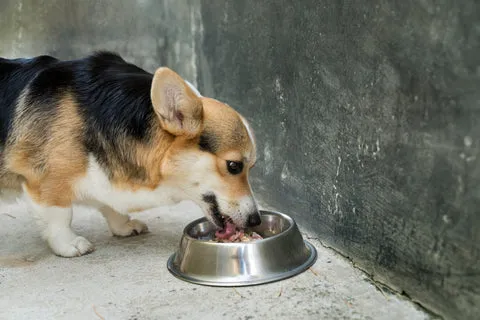 A Corgi eating a healthy meal from its bowl, showing a dog enjoying nutritious food.
A Corgi eating a healthy meal from its bowl, showing a dog enjoying nutritious food.
Preparation Instructions:
- Poach or steam: The best way to prepare fish for your dog is to poach or steam it. Place the fish in a pan of water (or a steamer), bring to a boil, then reduce heat and simmer for 10-15 minutes until fully cooked and flaky.
- Remove bones: Crucially, remove all bones before feeding. Fish bones can be small and sharp, posing a serious choking hazard or causing internal injury.
- Small pieces: Cut the cooked fish into small, manageable pieces.
- Cool and serve: Allow to cool completely before serving. When considering other seafood, understand what is the one meat dogs should not eat from the perspective of potential allergies or toxicity.
8. Oatmeal
Plain, cooked oatmeal, made from rolled oats, can be a soothing and fiber-rich food for dogs with an upset stomach. Its soluble fiber content can help regulate digestion and may aid in firming stools for dogs with diarrhea, or softening them for those with constipation. It also contains antioxidants that can help reduce inflammation.
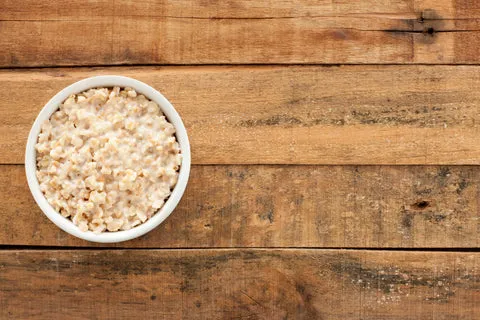 A warm bowl of plain cooked oatmeal, a fiber-rich food for dogs with digestive issues.
A warm bowl of plain cooked oatmeal, a fiber-rich food for dogs with digestive issues.
Preparation and Serving:
- Plain only: Cook plain rolled oats with water (not milk). Do not add any sugar, salt, artificial sweeteners, or flavorings.
- Moderate portions: While beneficial, don’t overdo it. Too much fiber can sometimes worsen an upset stomach. Offer small, controlled portions.
- Cool thoroughly: Ensure the oatmeal has cooled down to a safe temperature before serving.
9. Plain Yogurt
Plain, unsweetened yogurt, rich in probiotics, can be beneficial for supporting your dog’s gut health and aiding digestion. The live active cultures can help restore the balance of good bacteria in the intestines, which is often disrupted during illness or antibiotic treatment. It can be particularly helpful for constipation.
 An adorable puppy with a bit of plain yogurt on its muzzle, highlighting a probiotic-rich food for dog gut health.
An adorable puppy with a bit of plain yogurt on its muzzle, highlighting a probiotic-rich food for dog gut health.
Important Notes:
- Absolutely plain: Ensure it’s plain, natural yogurt with no added sugars, artificial sweeteners (especially xylitol, which is highly toxic to dogs), or fruit.
- Lactose intolerance: Some dogs are lactose intolerant. Start with a very small amount to see how your dog reacts. If they show signs of digestive upset, discontinue use.
- Serving: A few spoonfuls can be given as a treat or mixed into other bland foods. It can even be frozen into a cool treat for a sick dog who needs encouragement to hydrate.
10. Eggs
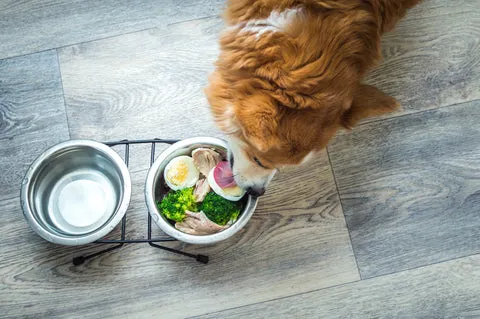 A dog enjoying a meal of scrambled eggs and mixed vegetables, a protein-rich option for recovering dogs.
A dog enjoying a meal of scrambled eggs and mixed vegetables, a protein-rich option for recovering dogs.
If your dog is not actively vomiting, eggs can be an excellent and gentle source of protein, helping to boost energy levels during recovery. They are highly digestible and packed with vitamins and minerals, making them a good option for lethargic dogs post-illness.
Preparation Instructions:
- Cook simply: Scrambled (without butter, oil, or seasoning) or boiled eggs are the best options.
- Avoid if vomiting: If your dog is currently vomiting, it’s best to avoid eggs as their richness might exacerbate nausea. Wait until vomiting has subsided.
- Small portions: Offer a small amount initially to ensure it doesn’t upset their stomach.
When to Seek Veterinary Advice
While these bland diet options can be very helpful, it’s crucial to understand when to consult a veterinarian. **Do not delay seeking professional help if your dog:
- Vomits repeatedly (more than once or twice a day).
- Has severe or bloody diarrhea.
- Is extremely lethargic, unresponsive, or weak.
- Refuses to eat or drink for more than 24 hours.
- Shows signs of abdominal pain (whining, panting, hunched posture).
- Has a fever.
- Is a puppy, elderly, or has a pre-existing health condition.**
Dehydration is a significant risk with vomiting and diarrhea. Encourage small, frequent sips of water or offer ice chips.
Addressing Long-Term Digestive Sensitivities & Allergies
If your dog frequently experiences an upset stomach or recurring illness, it may indicate a food allergy or sensitivity. In such cases, your veterinarian might recommend a specialized diet. Certain ingredients are known to trigger adverse reactions in some dogs, which is why understanding what should French Bulldogs not eat or other specific breeds is vital.
Here are some types of specialized foods often recommended for dogs with chronic digestive issues or allergies:
Cold Pressed Dog Food
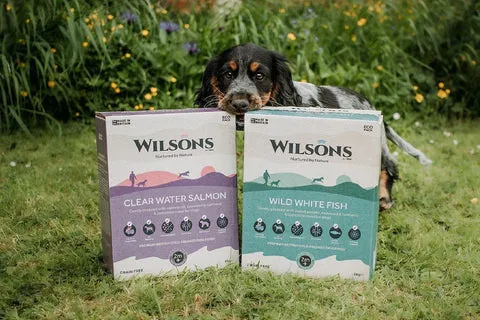 A happy dog posing next to a bag of cold-pressed dog food, a good choice for dogs with food sensitivities.
A happy dog posing next to a bag of cold-pressed dog food, a good choice for dogs with food sensitivities.
Cold-pressed dog food is a type of dry food produced at much lower temperatures than traditional kibble. This minimal processing helps retain the natural integrity and nutritional value of the ingredients. Because it breaks down more easily in the stomach, it can be an excellent option for dogs with sensitive digestive systems or those prone to bloating. Many brands offer grain-free or limited-ingredient cold-pressed options, which can be beneficial for dogs with common food allergies.
Insect Protein Dog Food
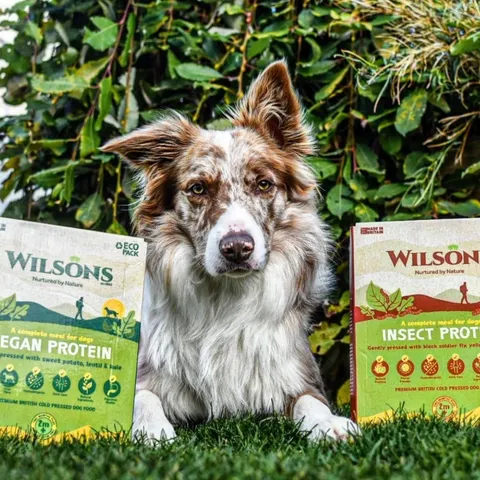 A contented Collie dog with a bowl of insect protein dog food, suitable for dogs with meat allergies.
A contented Collie dog with a bowl of insect protein dog food, suitable for dogs with meat allergies.
For dogs with allergies to common protein sources like chicken, beef, or lamb, insect protein dog food offers a novel and hypoallergenic alternative. Insects like black soldier fly larvae are highly nutritious, complete protein sources, often containing more protein than conventional meats. This makes them an ideal choice for dogs with sensitive stomachs or specific meat-related allergies. As a bonus, insect-based diets are also more sustainable.
Raw Frozen Dog Food
 A dog named Dougal enjoying a meal of raw and cold-pressed dog food, beneficial for sensitive digestive systems.
A dog named Dougal enjoying a meal of raw and cold-pressed dog food, beneficial for sensitive digestive systems.
A raw food diet, consisting of minimally processed, natural ingredients (meat, offal, bone, and sometimes vegetables), can be transformative for dogs with chronic sensitivities or allergies. Many raw diets are grain-free and free from artificial additives, which often trigger adverse reactions. The natural enzymes and nutrients in raw food can aid digestion and improve overall health, often leading to better coat condition and reduced digestive upset. It’s important to choose reputable raw food brands that adhere to strict safety standards and provide balanced nutrition. You might also consider exploring what vegetables can I give my dog to complement a raw diet effectively.
Conclusion
Caring for a sick dog requires patience, attentiveness, and providing the right kind of nourishment. Offering a bland, easily digestible diet using options like boiled chicken, white rice, pumpkin, or bone broth can significantly aid in their recovery and soothe an upset stomach. Always introduce new foods slowly and in small amounts to monitor for any adverse reactions.
Remember, while this guide offers valuable information on what you can feed your dog when they are sick, it is not a substitute for professional veterinary care. Your veterinarian is your best resource for diagnosing the cause of your dog’s illness and recommending the most appropriate course of treatment and diet. By being prepared with wholesome, gentle food options and knowing when to seek expert help, you can ensure your beloved canine friend receives the best possible care during their recovery. For more tips on maintaining your dog’s health and well-being, explore other valuable resources on Dog Care Story.
